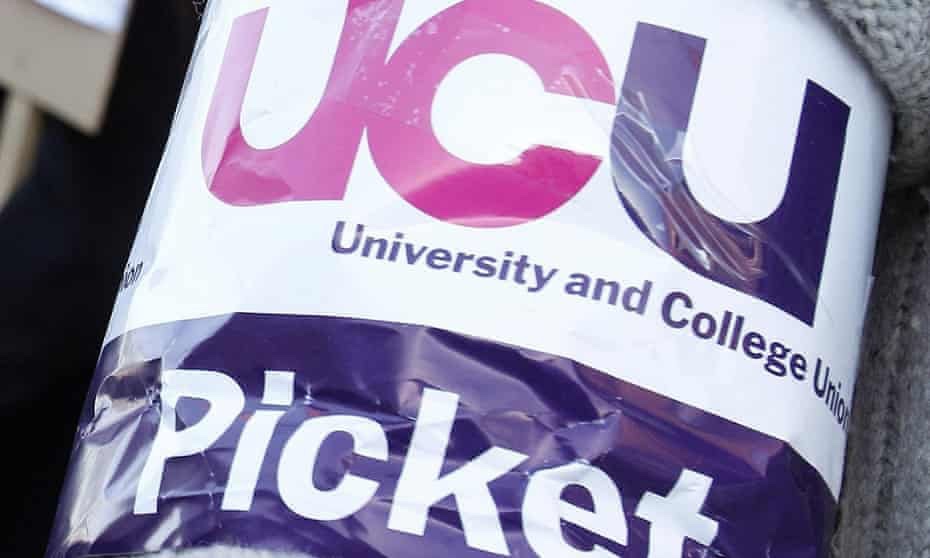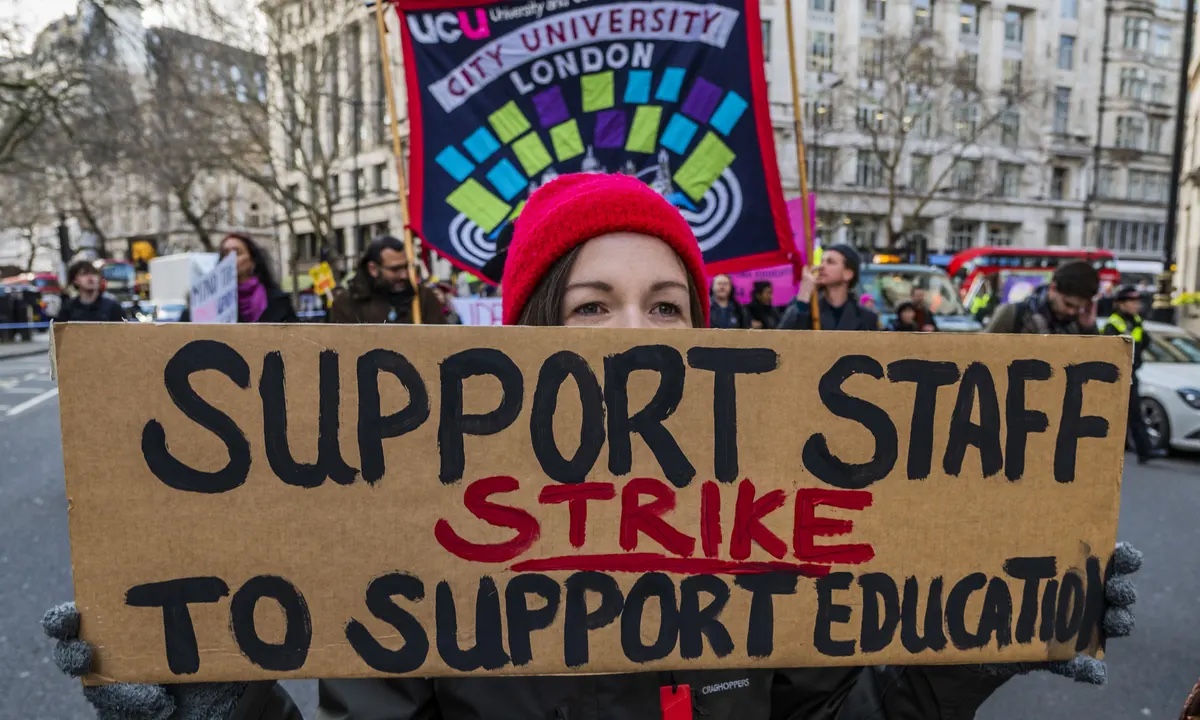University of Essex staff strike for third time in 3 years
Thomas Morgan and Rozenn Quernee take a look at the strike action taken by some members of staff at Essex last week …..
Why are the staff striking?
Last week staff members represented by the UCU union at the University of Essex went on a 3-day strike, lasting from the 1st to the 3rd of December.
Staff are striking due to a real term decline in their pay, issues regarding employer contribution to their pensions, working conditions and broader issues around equality in the Higher education sector.
The ‘Four Fights dispute’ concerns the way staff are being paid. They are demanding wage increases for the amount of workload they are undertaking.
At the University of Essex in particular, a survey has revealed that staff members feel like they have too much to do each day and can rarely take breaks due to the scale of work.
Staff members striking at Essex also expressed that this heavy workload has affected their personal lives, with some claiming they have been unable to take the holiday they were entitled to.
Insecurity is one of the main issues at stake in this industrial action dispute. Strikers argue that an increase in insecure fixed-term and zero-hour contracts is being created in the higher education sector, rather than long term stable employment opportunities.Strikers also argue that the Covid-19 pandemic has exacerbated this issue further.
Perceived Inequality is a vital part of the dispute; in the UK higher education system, the wage gap has become an increasingly severe topic, with Women, black people and people with disabilities being the groups most affected by these disparities.
The staff are also striking for their pension rights. The USS (Universities Superannuation Scheme) is a pension scheme for current and retired academic staff. Usually, the team are the ones who will decide collectively how much they pay into this pension scheme, in collaboration with University representatives.
The UCU union has criticised Universities U.K (UUK). This umbrella body represented 140 universities in the U.K. and requested that it asks the employers to withdraw the changes to the pension scheme and to pledge to contribute more.
The UUK has condemned the UCU union as being at “odds with reality” and that its members had reached the “limit of affordability” in regards to contributions to the USS scheme, further undermining any hope of a resolution to the dispute between the two sides.
The UUK has, however, pointed out that only one in four USS scheme members are part of the UCU union, implying their demands do not represent a majority of academic staff in the U.K.
How will the strikes affect the students?
As a result, some students have been affected by the strikes by having classes cancelled on these days.Even though disruption occurred, main campus facilities remained open during the strike.
In their information ballot, the UCU (University and College Unions) declared that the staff would be striking for the university (their superiors) to listen to their demands.
Students in the last year of their degrees have pointed out that they have been experiencing strikes since 2019. This may have a lasting impact on their studies as they have dealt with the consequences of the pandemic too.
Rebel has asked the Essex UCU representatives for comment. The complete statement and quotes from staff can be found on our Instagram @RebelEssex
One member of staff on strike told Rebel:
“In the past five years, I have worked at least an extra 4 months each year on top of my ordinary working hours. I have done this because I care deeply about our students. I do not get paid for that work, nor do I get this time back.
My mental and physical health has suffered as a result. I am not alone in working very long hours – many of my colleagues are in the same position, and I don’t want this for future generations of university employees either”.
Staff member at the University of Essex
Another staff member spoke about the issue of job security in academia:
“I work primarily with post-graduate and early career researchers and can see the impact on the daily lack of opportunities, insecure work, and zero-hours contracts.
When working with Masters and PhD students, I am acutely aware that I am supporting them to succeed in their studies, whilst also having to constantly remind those who want to go into academia that only about 30% of them will ever get permanent jobs as academics.
It is hugely disheartening and a terrible disconnect between their enormous efforts, and their future options”.
Staff member at the University of Essex

Photograph: Peter Byrne/PA
What Essex students think
We spoke to students and asked them about how they felt about the prospect of further strikes, One student told Rebel:
“I think that our teachers should be paid more because they are vital for our society. All specialists go through their hands and without them we wouldn’t have a lot of industries, I think they should be rewarded better for their effort” –
Essex Student
Another took a different view and said :
“Strike action doesn’t make a difference. It’ll be meetings and discussions that change minds, not causing an inconvenience to students… after last year, I think there’s a lot of students myself included- that are seriously doubting the value of a degree and the quality of education”
Essex student

Photograph: Guy Bell/Rex/Shutterstock
The University of Essex’ response:
We received a statement from the University of Essex, it reads as follows
“The University of Essex is committed to working with staff to minimise the impact of industrial action on our students and to safeguard their education. “During the strike period, we will remain open on all our campuses.
We will be working with academics to provide students with as much advice and guidance as possible and will ensure the impact on studies will be minimised.” Background for information
The University of Essex is one of 58 universities impacted by strike action between December 1-3….
University of Essex spokesperson
The full statement can be viewed on Rebel’s Instagram account @Rebelessex
What is the National context?
According to the UCU, pay for academic staff has been cut by 17% in real terms during the last ten years. Campaigners have argued that University leadership needs to address the issue once and for all to avoid strikes occurring annually.
The National Union of Students has backed the strikes, despite concerns from many students over disruption. According to the Guardian, there have been some discrepancies with pension cuts.
The UUK (Universities UK) has allegedly underestimated the percentage of pension cuts compared to what the USS had calculated. This is due to senior university managers supposedly giving the UUK the wrong figures, according to the UCU.
The UUK has hit back at these claims by insisting that the 35% annual pension reduction figure (provided by the UCU is wrong, and it is between a 10-18% cut to staffs retirement guaranteed pension benefit.
However, a model published by USS trustees shows a 41% cut in future retirement benefits, according to the Guardian.
The UUK argues that the 21% cap on employer pension contributions should be maintained to avoid departmental cuts and cuts to investment in facilities, which they claim will impact students.
Lecturers and staff members who are part of the UCU feel that industrial action is their only option to be heard. Those striking express frustration at inaction over this matter and describe the UUKs actions as an attempt to deflect and undermine the strikes.
The UUK has accused the UCU leadership of infiltrating left-wingers associated with the socialist worker’s party.
Students across England, Scotland, Wales and Northern Ireland may fear that the strikes are another threat to their degrees, much like Covid has been.
For students in their final year, they have experienced three consecutive years of industrial action, the consequences of which are still unknown.
However, despite these concerns, departments at Essex have assured students they will consider any disruption to assessment and teaching. Still, there are growing calls for compensation for students affected by three years of strikes, along with the impact of Covid on their education and mental health.
These strikes are seen as a way for staff members to request that their superiors make their working conditions better and fairer.
Over the last three years, the strikes have become more severe as the demands have not been met, and some staff members feel as if they keep on being disregarded by the Universities and Colleges Employers Association (UCEA), which represents Universities in national negotiations with trade unions and other stakeholders.
The disputed figures provided by UUK (given to them by Vice-Chancellors) allegedly grossly underestimate the extent of wage cuts, according to data by an independent body who looked into this issue of wage growth and pay for the UCU union.
Statement from Universities UK
“We regret that the UCU is proceeding with plans for industrial action although fewer than 10% of eligible pension scheme members voted yes to strike action. Strike action will not address the urgent need for reform to keep the scheme affordable.
“Universities will put in place measures to minimise the impact on students, other staff and the wider university community and will ensure that students can continue to learn and receive support.
“We have repeatedly stated willingness to consult employers on any viable, affordable and implementable alternative proposal from the UCU and we remain fully committed to continuing talks to develop a joint approach to the future of the pension scheme.”
Universities U.K.
The University of Essex has stated that they are committed to having talks about a joint approach to the pension scheme and have sought to reassure students they will not be penalised for any disruption due to industrial action.
However, with the UCU warning that this is not the end of the dispute, it leaves severe questions for The Universities leadership to meet the interests of both staff and students.